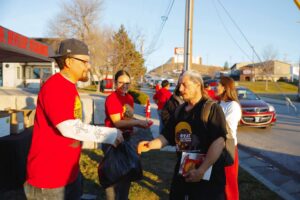
One morning this past week, I did what all mental health experts tell you not to do: I woke up and immediately checked my phone. My social media feeds were full of images of empty streets and abandoned street vendor carts. My phone had a pile of unread texts from LA Street Vendor Campaign members wondering if anyone had heard from “Gerardo.” His cart had been found at his regular street corner filled with spoiled food—a sign that he’d been missing for days.
The reckless pursuit of “mass deportation”—loudly touted by the administration of Donald Trump and his supporters—has descended on Los Angeles in the form of masked men in unmarked cars, who are picking up anybody who looks like a working-class Latino or Latina—especially “open air workers” like construction and car wash workers, and street vendors.
The reckless pursuit of “mass deportation”…has descended on Los Angeles in the form of masked men in unmarked cars.
These actions by federal ICE (Immigrations and Customs Enforcement) officials are a violation of human rights. And there are good folk who are filing lawsuits seeking to protect people’s due process rights.
But what’s taking place in Los Angeles has broader implications as well. What is happening is nothing less than the destruction of a local economy—and a community.
A City Rises: The Value of Street Vendors in Los Angeles
If you’re not from Los Angeles, you may think of us as atomized drivers negotiating a forest of highways. But if you live here, you know that some of our streets are brimming with dynamism, culture, and pedestrians.
In many parts of Los Angeles—whether you live in the San Fernando Valley or the Eastside or South Central—you’ll find corridors of street vendors who are selling everything from tajin-topped fruit to blue-corn quesadillas and tacos.
Street vendors help our city thrive. The stands and carts are beacons of cultural pride—with their rainbow umbrellas and the bells jingling off of ice cream carts. Proclamations of “Tamales, champurrado, vengan!”—“Come get tamales and Mexican hot chocolate!”—echo throughout the streets of so many city neighborhoods.
One of my favorite benefits of street vending, beyond consuming the tasty food and drink that these vendors sell, is the impact they have in the evening. Their entrepreneurism literally illuminates vacant lots and desolate streets—and turns them into lively places. They are, in fact, the Los Angeles version of what Jane Jacobs famously described in New York City’s Greenwich Village as “eyes on the street.”
Vendors themselves are part of a kaleidoscope of entrepreneurs that make California the fourth largest economy in the world.
As LA’s street vendors occupy underutilized space with temporary tables and chairs, they enable families on a budget to sit and eat “al fresco” next to their taquero [taco vendor], and on many evenings, they may find old and new friends doing the same. Street vendors’ effect on the urban fabric, in short, has been profound.
They also bring real money into the city. Their entrepreneurism creates jobs for themselves and their families, while supporting the local economy through countless business-to-business transactions.
A decade ago, a group of scholars estimated street vendors contribute over $500 million in economic activity in Los Angeles alone. Vendors’ presence also complements the activities of brick-and-mortar businesses.
These insights are grounded for us in real experience, too. For the last 15 years, the group I help lead, Inclusive Action for the City, has worked alongside a mighty coalition of street vendor leaders and mission-driven organizations like Community Power Collective, Public Counsel, and East LA Community Corporation to protect street vendors and provide opportunities for them to enter our formal economy. Together, we’ve passed two statewide policies and more local ordinances that create a formal pathway for street vendors to get permits so they can build their businesses in peace.
For us, street vending is a first step on the ladder of economic mobility, and the vendors themselves are part of a kaleidoscope of entrepreneurs that make California the fourth-largest economy in the world.
Sign up for our free newsletters
Subscribe to NPQ's newsletters to have our top stories delivered directly to your inbox.
By signing up, you agree to our privacy policy and terms of use, and to receive messages from NPQ and our partners.
This is a path, by the way, as old as this country—reflecting the experience of many past waves of other US immigrants, such as the pushcart vendors in New York City’s Lower East Side in the late 19th century.
We Need More Than Talking Points
But this month in Los Angeles, the actions of masked federal agents terrorizing immigrant communities is something that cannot be combated with habitual talking points that include “immigrants contribute to our economy.”
Frankly, I’m tired of trying to prove that street vendors add meaningful value to everyone in our city. I’m growing resentful of the never-ending task of demonstrating that street vendors make our streets safer, that they create jobs, and that an inclusive economy means a stronger economy for everyone.
Yes, we can generate data about the economic contributions that “Gerardo” makes to his city, and the businesses he supports through his business, but what’s happening here is not about that. It’s about our humanity.
At the root of what’s happening is a deep-seated racism in our country—a fear of people who are different and an insecurity that inviting others into our community will somehow strip something away from what we have.
This is a moment to release ourselves from the illusion that the disappearance of our neighbors is “not our lane” or “too political.”
The assault on Senator Alex Padilla—the first Latino to be elected to that position in the history of the Golden State—for daring to ask a question of a White cabinet secretary ranting about “liberating” Los Angeles from protesters tells us volumes about who is being given permission to voice their concerns.
Heather McGhee’s book, The Sum of Us, reminds us of the damage such racism does to both victims and so-called “winners,” noting, for example, how cities have chosen to drain public pools rather than integrate them—a loss for the entire community. We now have an administration choosing a scorched-earth campaign on immigrants rather than embracing the economic and social gains from newcomers that benefit us all.
A Call for Action
Right now, Los Angeles is standing up to defend our neighbors as best as we can—putting our bodies on the line, and demanding accountability from our government.
Some community-based organizations are developing care systems for families grieving the loss of their family members, while others are deepening mutual aid infrastructure to get financial support to struggling businesses and workers.
But we need more. This is a moment for nonprofits and movement leaders to shed the myth that we are not connected to each other. This is a moment to release ourselves from the illusion that the disappearance of our neighbors is “not our lane” or “too political.”
And it is not just nonprofits and movements who must act. Banks too need to speak up. Fortune 500 companies need to speak up. Elected officials from all walks of life need to speak up. And yes, we even need law enforcement to speak up about the lack of due process and the ways in which deploying the National Guard and the Marines has simply inflamed passions.
Every profession, every trade association, and every conference that is taking place right now should be lifting up what’s happening in our communities.
Because if “Gerardo” is taken from our community, we lose more than a contributor to GDP, more than a hardworking member of our workforce, and more than a beloved street vendor—we begin to lose our humanity.











